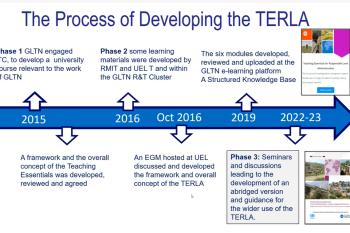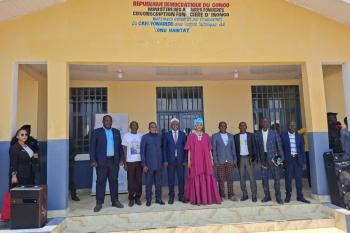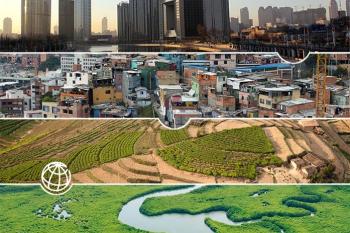
Land and Climate Change Stakeholders Workshop Held in Kampala, Uganda
Kampala, 3 September 2025 — The Global Land Tool Network (GLTN), facilitated by UN-Habitat with support from the Netherlands Enterprise Agency (RVO), hosted a stakeholder dialogue on land and climate change at the UN-Habitat offices in Kololo. The meeting brought together representatives from government institutions, civil society organizations (CSOs), academia, and the consultancy team supporting the ongoing review of the National Land Policy (NLP).
The workshop followed a study on land and climate change commissioned by the Ministry of Lands, Housing and Urban Development (MLHUD) and funded by RVO through the LAND-at-Scale programme in Uganda. The study analyzes how climate risks affect land use, livelihoods, and tenure security, and proposes evidence-based policy recommendations to inform the NLP review. As part of this process, a one-day stakeholder engagement was organized to validate findings and gather feedback.
The dialogue focused on reviewing the study’s draft report and providing targeted inputs to strengthen it. The overarching aim is to ensure climate change is effectively integrated into the land policy framework to build resilience, safeguard tenure security, and promote sustainable land management.
Mr. Ssembatya Felix Joseph, Commissioner for Land Administration at MLHUD, officially opened the meeting. He noted that land and climate change are closely interlinked and central to Uganda’s development pathway, including Vision 2040, and to the well-being of all Ugandans. He emphasized continued collaboration among government, development partners, CSOs, and communities to promote tenure security and strengthen climate resilience.
During the dialogue, stakeholders identified key climate change issues and gaps that need to be addressed. These included:
• Recognizing climate as a key driver of land challenges: Stakeholders stressed that climate change must be treated as a core driver of land challenges, not a peripheral issue.
• Integration of climate change into policy and implementation: Participants called for stronger integration of climate considerations within existing policy frameworks and for clearer, more effective implementation mechanisms.
• Clarifying mandates: The study should distinguish issues within MLHUD’s mandate from cross-cutting matters and clearly identify the responsible Ministries, Departments and Agencies (MDAs) for those outside MLHUD’s scope.
• Paying more attention to adaptation: Uganda’s land sector has focused more on mitigation to date. Participants highlighted the urgent need to elevate adaptation, given its direct effects on land use, livelihoods, and the resilience of vulnerable communities.
Next steps:
Feedback from the dialogue will be incorporated into the final Land and Climate Change report. The report will inform the NLP review to ensure the revised policy responds effectively to climate-related challenges and opportunities in Uganda’s land sector.


